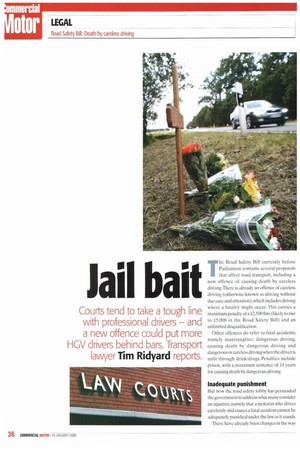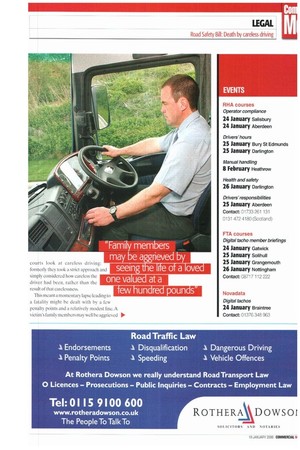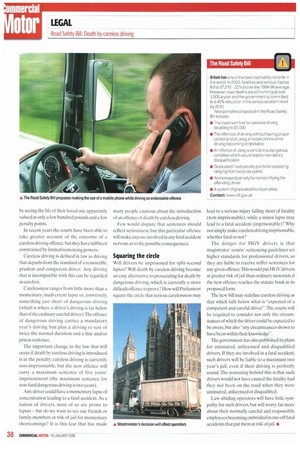Jail bait
Page 36

Page 37

Page 38

If you've noticed an error in this article please click here to report it so we can fix it.
Courts tend to take a tough line with professional drivers — and a new offence could put more HGV drivers behind bars. Transport
lamer Tim Ridyard reports. The Road Safety Bill currently before Parliament contains several proposals that affect road transport. including a new offence of causing death by careless drivi ng. There is already an offence of careless driving (otherwise known as driving without due care and attention), which includes driving where a fatality might occur. This carries a maximum penalty of a £2,500 fine (likely to rise to £5.000 in the Road Safety Bill) and an unlimited disqualification.
Other offences do refer to fatal accidents, namely manslaughter, dangerous driving, causing death by dangerous driving and dangerous or careless driving when the driver is unfit through drink/drugs. Penalties include prison, with a maximum sentence of 14 years for causing death by dangerous driving.
Inadequate punishment
But now the road safety lobby has persuaded the government to address what many consider an injustice: namely that a motorist who drives carelessly and causes a fatal accident cannot be adequately punished under the law as it stands.
There have already been changes in the way courts look at careless driving: formerly they took a strict approach and simply considered how careless the driver had been, rather than the result of that carelessness.
This meant a momentary lapse leading to a fatality might he dealt with by a few penalty points and a relatively modest line. A victim's family members may well be aggrieved by seeing the life of their loved one apparently valued at only a few hundred pounds and a few penalty points.
In recent years the courts have been able to take greater account of the outcome of a careless driving offence. hut they have still been constrained by limited sentencing powers.
Careless driving is defined in law as driving that departs from the standard of a reasonable, prudent and competent driver. Any driving that is incompatible with this can be regarded as careless.
Carelessness ranges from little more than a momentary, inadvertent lapse or. conversely. something just short of dangerous driving (which is where a driver's driving is far below that of the ordinary careful driver).The offence of dangerous driving carries a mandatory year's driving ban plus a driving re-test of twice the normal duration and a fine and/or prison sentence.
The important change in the law that will occur if death by careless driving is introduced is in the penalty: careless driving is currently non-imprisonahle, but the new offence will carry a maximum sentence of five years' imprisonment (the maximum sentence for non-fatal dangerous driving is two years).
Any driver could have a momentary lapse of concentration leading to a fatal accident. As a nation of drivers, most of us are prone to lapses — but do we want to see our friends or family members at risk of jail for momentary shortcomings? It is this fear that has made many people cautious about the introduction of an offence of death by careless driving.
Few would dispute that sentences should reflect seriousness, but this particular offence will make anyone involved in any fatal accident nervous as to the possible consequences.
Squaring the circle
Will drivers be imprisoned for split-second lapses? Will death by careless driving become an easy alternative to prosecuting for death by dangerous driving, which is currently a more difficult offence to prove? How will Parliament square the circle that serious carelessness may lead to a serious injury falling short of fatality (non-imprisonable). while a minor lapse may lead to a fatal accident (imprisonable)? Why not simply make careless driving imprisonable, whether fatal or not'?
The danger for HCiV drivers is that magistrates' courts' sentencing guidelines set higher standards for professional drivers, so they are liable to receive stiffer sentences for any given offence:This would put HGV drivers at greater risk of jail than ordinary motorists if the new offence reaches the statute book in its proposed form.
The new bill may redefine careless driving as that which falls below what is "expected of a competent and careful driver". The courts will be required to consider not only the circumstances of which the driver could be expected to be aware, but also "any circumstances shown to have been within their knowledge".
The government has also published its plans for uninsured, unlicensed and disqualified drivers. If they are involved in a fatal accident, such drivers will he liable to a maximum two year's jail, even if their driving is perfectly sound. The reasoning behind this is that such drivers would not have caused the fatality had they not been on the road when they were uninsured, unlicensed or disqualified.
Law-abiding operators will have little sympathy for such drivers, but will worry far more about their normally careful and responsible employees becoming embroiled in one-off fatal accidents that put them at risk of jail. •
































































































































































































